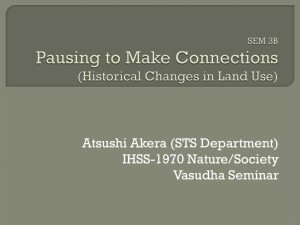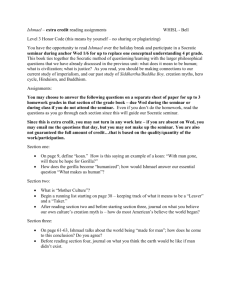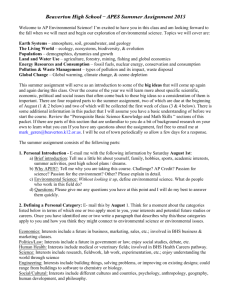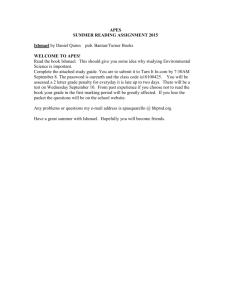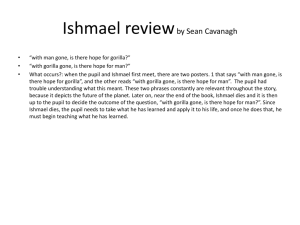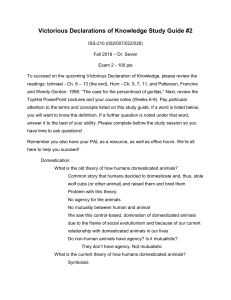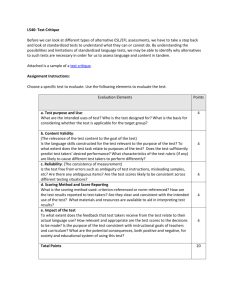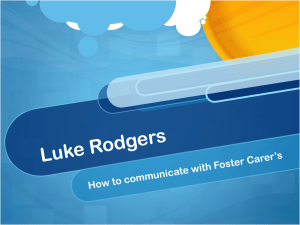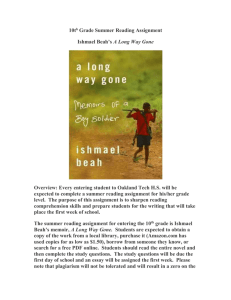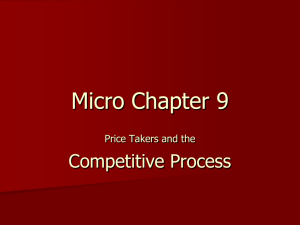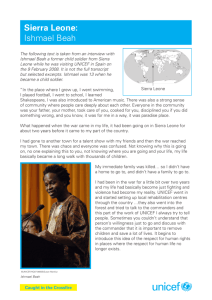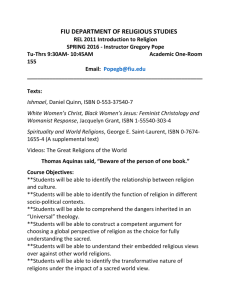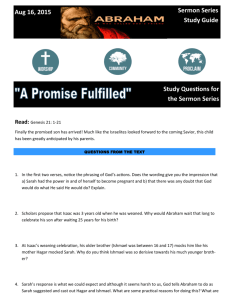Ishmael Study Guide
advertisement
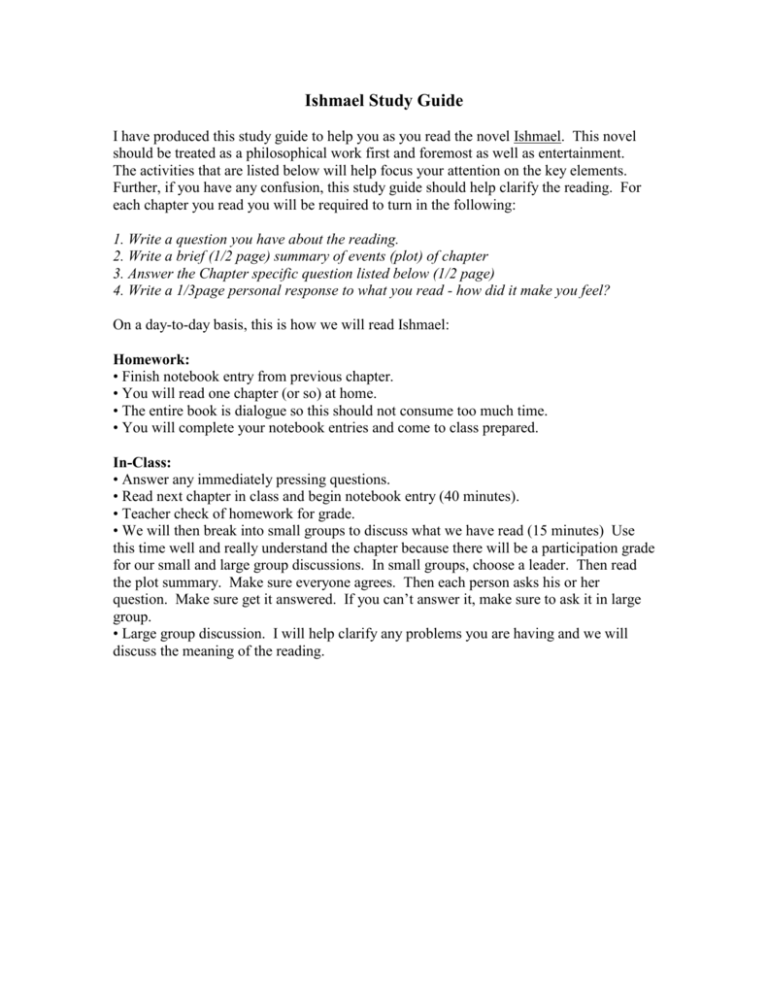
Ishmael Study Guide I have produced this study guide to help you as you read the novel Ishmael. This novel should be treated as a philosophical work first and foremost as well as entertainment. The activities that are listed below will help focus your attention on the key elements. Further, if you have any confusion, this study guide should help clarify the reading. For each chapter you read you will be required to turn in the following: 1. Write a question you have about the reading. 2. Write a brief (1/2 page) summary of events (plot) of chapter 3. Answer the Chapter specific question listed below (1/2 page) 4. Write a 1/3page personal response to what you read - how did it make you feel? On a day-to-day basis, this is how we will read Ishmael: Homework: • Finish notebook entry from previous chapter. • You will read one chapter (or so) at home. • The entire book is dialogue so this should not consume too much time. • You will complete your notebook entries and come to class prepared. In-Class: • Answer any immediately pressing questions. • Read next chapter in class and begin notebook entry (40 minutes). • Teacher check of homework for grade. • We will then break into small groups to discuss what we have read (15 minutes) Use this time well and really understand the chapter because there will be a participation grade for our small and large group discussions. In small groups, choose a leader. Then read the plot summary. Make sure everyone agrees. Then each person asks his or her question. Make sure get it answered. If you can’t answer it, make sure to ask it in large group. • Large group discussion. I will help clarify any problems you are having and we will discuss the meaning of the reading. Chapter Specific Assignments The intention on the chapter specific questions is that you will STRUGGLE and THINK. There are no right answers - only good thoughtful responses! Chapter 1: Are we(our society) being lied to about something? Why/Why not? Chapter 2: (a) Define Takers and Leavers. (b) If you went on a street and asked any random person (Buddhist, Jew, Muslim, Atheist, Black, White, etc.) what our creation story was, what would they say? In other words, how did we come to be living on this planet? Chapter 3: (a) Write the beginning of the story. (b) What is the Middle and End of the story (Think!!)? Chapter 4: Did Humans become HUMAN when they started to rule the world? Why/why not? Chapter 5: What is the other story? Chapter 6: (a) Before reading, answer this question: Are we a successful society or not? Why/Why not(1/2) page. (b)After reading: Is the Taker Thunderbolt analogy accurate? Why or why not? Chapter 7: What is the law of life? Hint: Think about the A's, B's and C's. Chapter 8: (a) Express clearly the connection between population growth and food production. (b) Describe the story the Leavers are enacting. Chapter 9: (a) What is the proper knowledge of the gods. (b) Critique Ishmael's understanding of the story of Adam and Eve/Cain and Abel. Is this interpretation plausible? why/why not? Chapter 10: (a) Finish this quote: The story of the fall and of Cain and Abel is the story of........ Why is this important?(b) Why do Leaver cultures work well? Chapter 11: What are the new definitions for takers and leavers? Chapter 12&13: Total: approx. 2 pages in notebook. (a) What is the most important aspect of this novel, according to you? (b) Are you glad or sad that you read it and why? (c) What is your critique of this novel? (d) Any other response (Total: approx. 2 pages in notebook). Graded Oral Discussion Questions Final Exam America and the Contemporary World Your task is to handwrite answers to ALL questions below. 1/2 page on each question, single-spaced, is a minimum. You will be graded on the written portion (50%) and how well you speak in class during the discussion (50%). My expectation is that each student should speak at least 7 times in depth and with knowledge! 1. Are we a successful society? Why/Why not? 2. Who are the Takers and what is the premise of their story. What is their creation myth. What are characteristics of their society. Are the Takers successful? 3. Who are the Leavers and what is the premise of their story. What are characteristics of their society. (Hint: Use the Lessons handout) Are the Leavers successful? 4. According to Ishmael, what is the Law of Life. Name all three parts and explain the metaphor of the A's, B's and C's. What does this law GUARANTEE? 5. Explain the metaphor of the Taker thunderbolt. Briefly describe the story and then explain why Ishmael told the story. In your opinion, is the Taker thunderbolt going up or down? 6. The story of Adam/Eve and Cain/Abel is symbolic of what historical event. Is Cain still killing Abel? Relate to knowledge of another conflict between agriculturists and nomadic people's. 7. What specifically did humans do to become Homo Sapiens Sapiens. What lifestyle did they lead? Why is this relevant? 8. "Then creation would go on forever" Evaluate this quote. Why is it vitally important for the student. What could be humanity's greater purpose, according to Ishmael. 9. What is Mother Culture? How does it work? 10. Why do you think that Quinn made Ishmael a Gorilla? 11. Would you recommend Ishmael to a friend. Why/Why Not? Be very specific! Discussion Questions: Chapter 1: Who is talking? How? What is the topic? Why is this a relevant topic for saving the world? Why is Ishmael qualified to talk about this topic? Chapter 2: How did Hitler hold the people of Germany captive? What is Mother Culture? Vocabulary: Takers/Leavers/ a story/ to enact/culture Mythology: Definition: The meaning of the World, the intentions of the gods, and the destiny of man. Chapter 3: What is the beginning of the story? How is our “creation story” a myth? What makes it mythology? What is the premise of takers story? Chapter 4: How do wombats and jellyfish live? What is man’s destiny? I.E. what is the middle and end of the story? Do you hear that “man was made to conquer and rule the world and turn it into a paradise?” in your life? how? when? examples? What is the price of becoming human? Chapter 5: According to our culture, what must man do and continue to do? What will we get?? Why have we not created a paradise? Discuss our view of human nature? What evidence is there that man is flawed? Why do we still only look at post-agricultural revolution man for answers when we now know the extent of human history? Why do we need prophets? What do they tell us? Is there knowledge of a how people ought to live? Is man’s flaw that we don’t know how to live?? Why does Ishmael call our story a SORRY one? Does the world of thought end with OUR culture? Chapter 6: Is the Taker Thunderbolt analogy accurate? Why/why not? Why doesn’t the airman realize he is falling? Why are people ho-hum about the end of the world coming? Is there any alternative? Are there any laws that govern life as aerodynamics governs flight? Chapter 7 What are the three guides? If human are flawed, why didn’t earlier humans destroy the world as we are? Are we really flawed? Chapter 8: What is the law of limited competition? Questions? Why do we think we are exempt? What happens when one member thinks they are exempt? Does this always happen? (deer story) Why is it holy work to kill off all competitors and anything that isn’t human food? What is OUR agricultural system designed to do? Is this realistic? Why do we have to force people, against their initial will, to live like us? What is mother cultures response to the population problem? Why doesn’t this work? Why did North American leavers limit their growth? Why don’t we live according to the law of life? “The Takers are a profoundly lonely people? (contact)” Explain. Chapter 9: Why will this story be hard for the takers to give up? When did the agricultural revolution begin and end? What is the knowledge of the gods? Who has it? The delusion of doing good? The takers had the one right way? How does Ishmael explain Cain/Abel? Chapter 10: Why did the author include this section about Ishmael being back in a carnival? What did the narrator do about it? What is the story of the FALL, historically? The story of Cain/Abel? What kind of knowledge do Takers accumulate to make their culture? How about Leavers? Explain the difference between a Leaver culture who save a way of life that works well for them and a Taker culture who has the one right way? Wisdom/cleverness? Why does the narrator call the Taker story ugly? Do you agree/disagree? Chapter 11: Why is our story so appealing to us? So hard to give up? What would we need to give it up? What does Mother Culture teach us about life BEFORE the Agricultural Revolution? Would you trade your life for a Leaver existence? Why not? Using the example in the book, would you trade THAT life? We pride ourselves on being inquisitive, yet we don’t really investigate Leaver cultures as more than things too be looked at with amazement – how stupid are these folks? – Why? What does the Agrev do for us? Why is it still, even in the face od impending disaster, so appealing? New Names for Takers and Leavers Chapter 12: What happens to people who live in the hands of the gods? What is the leaver premise? Middle? End? What COULD human destiny be? What examples is there that provide hope? Explain the similarity between the prison and Taker life?
